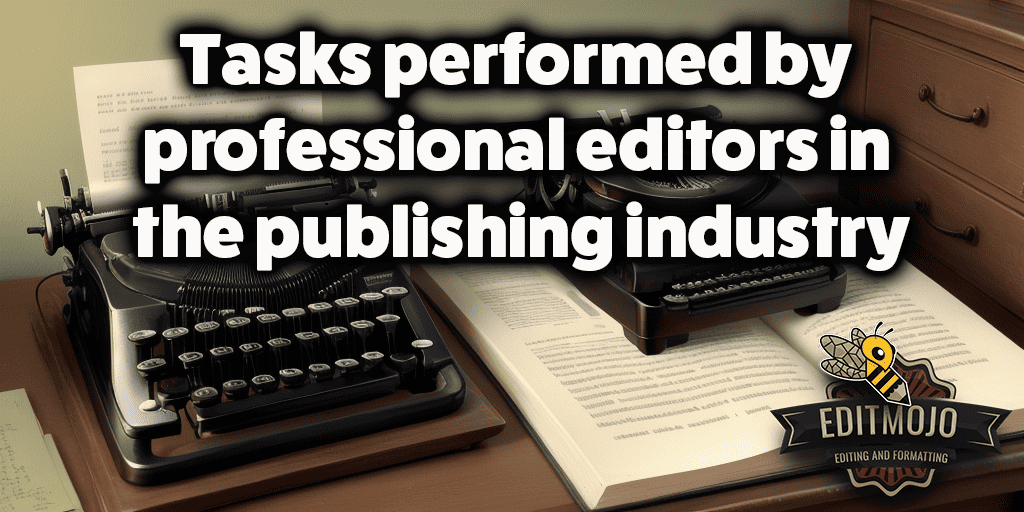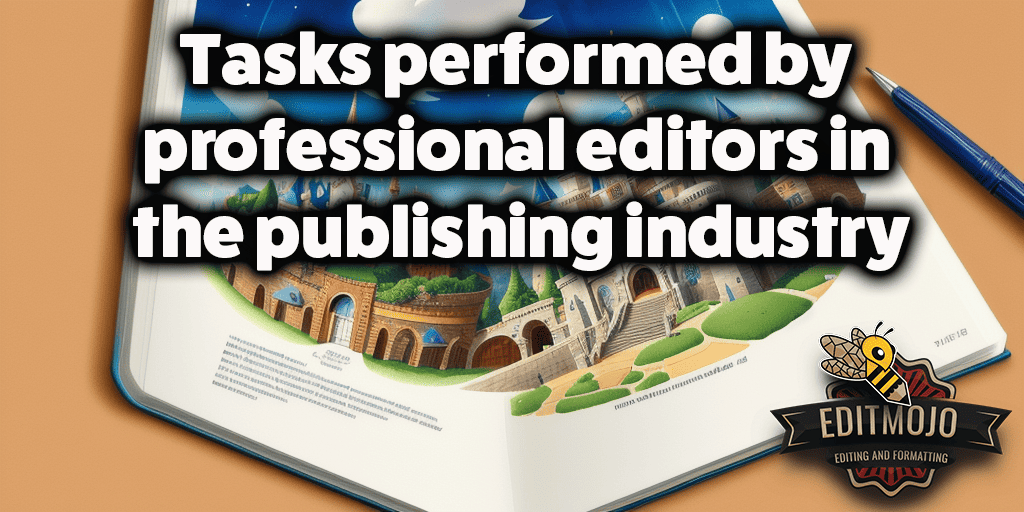Tasks performed by professional editors in the publishing industry
Tasks performed by professional editors in the publishing industry. The role of professional editors is pivotal. They are the unsung heroes who work behind the scenes, meticulously refining manuscripts and ensuring they meet the highest standards of quality. From reviewing initial drafts to final proofreading, professional editors perform a myriad of tasks that significantly contribute to a manuscript’s journey from the writer’s desk to the reader’s hands. This article delves into the fascinating world of professional editors, exploring their key responsibilities, the editing process, and the essential skills they bring to the table.
Key Takeaways
| Key Points | Summary |
|---|---|
| Types of Editors | There are various types of editors, including acquisition editors, developmental editors, copy editors, and proofreaders, each with a unique role in the publishing process. |
| Editor Responsibilities | Editors are responsible for reviewing and evaluating manuscripts, working with authors to refine their work, ensuring consistency and accuracy, and coordinating with other professionals in the publishing process. |
| The Editing Process | The editing process involves initial manuscript assessment, structural and content editing, line editing and copyediting, proofreading, and final review. |
| Digital Age Editing | In the digital age, editors must adapt to new publishing platforms and formats, understand SEO and keyword optimization, and work with digital content management systems. |
| Essential Editor Skills | Professional editors need strong language and writing skills, attention to detail, excellent communication and interpersonal skills, problem-solving abilities, and familiarity with industry-specific software and tools. |
Professional editors play a crucial role. They are the invisible architects who shape and polish a manuscript, transforming it into a literary masterpiece ready for the reader’s discerning eye.
There are several types of editors in the publishing industry, each with a unique role. Acquisition editors scout for promising manuscripts and talented authors. Developmental editors work closely with authors to refine the structure and content of their work. Copy editors meticulously review the manuscript for grammar, punctuation, and style consistency. Finally, proofreaders give the manuscript a final check, catching any overlooked errors.
Editors shoulder a multitude of responsibilities. They review and evaluate manuscripts, ensuring they align with the publisher’s style and standards. They work closely with authors, providing valuable feedback and guidance. They also coordinate with other professionals in the publishing process, such as designers and marketers.

The editing process is a journey that begins with an initial manuscript assessment. This is followed by structural and content editing, line editing and copyediting, and finally, proofreading. The manuscript is then ready for a final review and approval.
In the digital age, the role of editors has evolved. They must now adapt to new publishing platforms and formats. Understanding SEO and keyword optimization has become crucial, as has working with digital content management systems.
To excel in their roles, professional editors need a specific set of skills. These include strong language and writing skills, attention to detail, excellent communication and interpersonal skills, problem-solving abilities, and familiarity with industry-specific software and tools.
Top Five Questions and Answers (Tasks performed by professional editors in the publishing industry)
| Questions | Answers |
|---|---|
| What are the different types of editors in the publishing industry? | There are various types of editors, including acquisition editors, developmental editors, copy editors, and proofreaders. |
| What are the key responsibilities of professional editors? | Editors are responsible for reviewing and evaluating manuscripts, working with authors to refine their work, ensuring consistency and accuracy, and coordinating with other professionals in the publishing process. |
The role of professional editors in the publishing industry is both challenging and rewarding. They are the gatekeepers of quality, ensuring that every published work meets the highest standards. As the publishing landscape continues to evolve, so too will the role of the professional editor, adapting and growing in this ever-changing industry.

VII. The Impact of Professional Editors
Professional editors are the unsung heroes of the publishing industry. Their meticulous work ensures that every published piece meets the highest standards of quality. They are the gatekeepers who ensure that every detail, from the storyline to the punctuation, is perfect. Their role is not just to correct grammar and punctuation errors, but to enhance the overall readability and appeal of the manuscript. They work closely with authors, providing valuable feedback and guidance that helps to refine and improve their work.
VIII. Future Trends in Editing
As the publishing industry continues to evolve, so too does the role of the professional editor. The rise of digital publishing has already brought significant changes, with editors now needing to be familiar with SEO and keyword optimization, digital content management systems, and new publishing platforms and formats.
In the future, we can expect to see even more changes. The rise of AI and machine learning could bring new tools and techniques to the editing process, while the growing popularity of self-publishing could lead to an increased demand for freelance editing services.

Despite these changes, the core skills and responsibilities of the professional editor will remain the same. Attention to detail, a strong command of language, and a deep understanding of the publishing process will always be essential.
Conclusion (Tasks performed by professional editors in the publishing industry)
In the dynamic world of publishing, the role of professional editors is more important than ever. They are the guardians of quality, ensuring that every published work is the best it can be. As the industry continues to evolve, so too will the role of the professional editor, adapting and growing in this ever-changing landscape.
Whether you’re an aspiring editor, an author, or simply a lover of books, understanding the role of professional editors gives you a deeper appreciation of the hard work and dedication that goes into every published work.
Top Five Questions and Answers
| Questions | Answers |
|---|---|
| What impact do professional editors have on the publishing industry? | Professional editors ensure that every published work meets the highest standards of quality. They work closely with authors, providing valuable feedback and guidance. |
| What future trends can we expect in editing? | Future trends may include the rise of AI and machine learning tools in editing, and an increased demand for freelance editing services due to the popularity of self-publishing. |
| Will the role of professional editors change in the future? | While the tools and techniques may change, the core skills and responsibilities of professional editors will remain the same. |
| Why is understanding the role of professional editors important? | Understanding the role of professional editors gives us a deeper appreciation of the hard work and dedication that goes into every published work. |
| How has digital publishing impacted the role of professional editors? | Digital publishing has led to editors needing to be familiar with SEO and keyword optimization, digital content management systems, and new publishing platforms and formats. |
